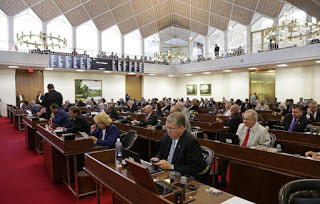 Here is something that is so well known in business, and so contrary to norms of fair competition, that we prefer not to teach it in business schools: For a large established firm, one of the best hammers for beating down competition from new ventures is influence over legislators. One of the best ways of wielding this hammer is to help them create cumbersome, expensive, and demanding legislation for new firms entering the business. Any kind of excuse will do. For example, societal concerns for safety and the environment can be twisted in ways that generate legislation with the main purpose of making it harder to establish new ventures. How can that be good for the large firm? After all, they need to expand their business now and then, and they will face the same legislation. That’s true, but unlike entrepreneurs, they have friends in the legislature who can create exceptions when needed. So, is there any way for the entrepreneur to enter a heavily regulated industry? Research by Jake B. Grandy and Shon R. Hiatt published in Administrative Science Quarterly shows one way this can happen: by receiving help from regulators. Why would regulators help entrepreneurs when legislators help established firms? This is a question that has two answers. The first answer is because they can: Legislation is usually written with some leeway, and regulators can interpret it to allow new entrants. Often, they will do so because strict interpretations can be challenged through appeals. The second answer is because they can: Legislators have many issues on their agendas, and they often grant regulators freedom to act on their own either by legislating some independence or by supervising regulators only loosely. Grandy and Hiatt tested this effect by examining delays in granting permissions for hydroelectric power plants. For such permissions, the independence of the regulator has no consequence for established firms – but for entrepreneurs, an independent regulator makes all the difference. The timing matters because the application and approval process can take many years. If the regulator is fairly independent, that period can be reduced by a year or more. But if legislators have reason to curtail the regulator’s independence, the application period can instead increase by many months. These accelerations and delays are important because they are where costs and benefits are found in this industry. The regulator can impose conditions that slow down a project and make it costly, but in the end, nearly all the applications are granted. Granting an application does not mean that the power plant will be built, however: The entrepreneur may have exhausted their financial resources by the time a project is approved, or required modifications may have made the project unprofitable. All of this means that help from regulators is necessary for entrepreneurs – and for a healthy level of competition in regulated industries. Grandy, J. B., & Hiatt, S. R. 2020. State Agency Discretion and Entrepreneurship in Regulated Markets. Administrative Science Quarterly, forthcoming. Comments are closed.
|
Blog's objectiveThis blog is devoted to discussions of how events in the news illustrate organizational research and can be explained by organizational theory. It is only updated when I have time to spare. Archives
May 2024
Categories |
 RSS Feed
RSS Feed